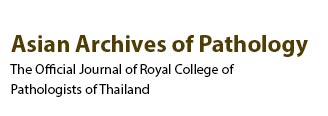Witoo Klabtawee1, M.D., Artit Jinawath1, M.D., Ph.D., Kaettipong Kamprerasart1, M.Sc., Lalida Arsa1, M.Sc., Vorachai Sirikulchayanonta2, M.D.,
F.R.C.Path. (Thailand)
1Department of Pathology, Faculty of Medicine Ramathibodi Hospital, Mahidol University 2Pathology unit, Faculty of Science, Rangsit University
ABSTRACT
Objective: Synovial sarcoma (SS) is a relatively common sarcoma of soft tissue arising on extremities of young adult, which is often diagnosed by histology and immunohistochemistry. Synovial sarcoma can have various locations and may cause diagnostic dilemma in tumors arising on unusual locations. In this study, we evaluate the application of molecular test by detection of SS18/SSX fusion transcripts as an additional diagnostic tool for synovial sarcoma.
Method: We performed the reverse transcription polymerase chain reaction (RT-PCR) to detect the presence of SS18/SSX fusion transcripts in 22 tumors from various anatomical sites previously diagnosed as SS or having SS in the differential diagnoses, from year 2010 to 2014.
Result: Of the total 22 cases analyzed, 14 cases (63.6%) were positive for SS18/SSX1 or SS18/SSX2 fusion transcripts by RT-PCR. The remaining 8 cases (36.4%) were negative for both SS18/SSX1 and SS18/SSX2 fusion transcripts. Among 14 cases with positive molecular testing results, 12 cases were previously diagnosed as SS (85.7%), whereas other 2 cases were originally diagnosed as other types of sarcoma (14.3%). On the other hand, from 17 cases which were initially diagnosed as SS by histology and IHC, 12 cases (70.5%) were positive, whereas 5 cases were negative for molecular testing. The diagnoses of SS18/SSX fusion negative cases were discussed.
Conclusion: We found that the detection of SS18/SSX fusion transcripts by RT-PCR is a valuable method to confi rm the diagnosis of SS, especially in those diffi cult cases arising on uncommon sites or unusual histology and unconventional immunohistochemical profi les.
Keywords:


